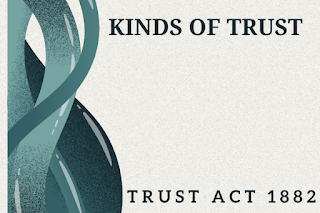KINDS OF TRUST
1. INTRODUCTION:
The Trust Act came into force in March 1882. This act does not affect the Islamic Law as of Waqf. A trust is a purely equitable obligation and is enforceable only in a court in which equity is administered. This Act extends to the whole of Pakistan.
2. MEANING:
The right is enforceable solely in equity.
3. DEFINITION:
A trust can be described as an equitable obligation that binds a person to deal with the property over which he has control for the benefit of persons of whom he may himself be one and anyone of whom may enforce the obligation.
Black's Law Dictionary: "The trust is a right of property, real or personal held by one party for the benefit of another. The trust is a legal entity created by a granter for the benefit of designated beneficiaries under the law of the state and the valid trust instrument."
4. KINDS OF TRUST:
There is a difference of opinion as to the classification of the trust because there is difficulty in extracting all kinds of trust. A comprehensive study is required for this purpose.
Mixed Trust:
A trust established to benefit both private individuals and charities.
Ministerial Trust:
Where the duties are ordinary and of a mechanical character involving routine intelligence, the trust is called a ministerial trust.
Private Trust:
A private trust primarily confers the benefits of the trust to uncertain persons. A private trust can be enforced by the beneficiary.
Public Trust:
A public trust confers a benefit to the public at large. A public trust may be a charitable trust. A public trust must justify its existence.
Voluntary Trust:
A voluntary trust is that made by a person of his own will without having received consideration for doing so.
Executory Trust:
A trust is said to be executory where although a valid trust is created, a further instrument is necessary to carry into effect the general intention expressed in the first instrument.
Discretionary Trust:
Where the duties involve a special intelligence and a greater element of judgment and discretion it is called a discretionary trust.
Special Trust:
A special trust imposes the duties on the trustee for the execution of the purpose which is pointed out by the author of the trust.
Simple Trust:
In a simple trust, the trustee has no duties to perform. This trust is also called the bare trust.
Precatory Trust:
The word precatory is obtained from the Latin term precarious which means the entreaty and the archaic. The meaning of precatory is that which is characterized by a lack of security or stability that threatens the danger.
Express Trust:
An express trust is created not by the facts and circumstances but by the express words of the author of the trust.
Constructive Trust:
Constructive trust arises from the operation of law. In certain circumstances, the legal owner of the property holds it in trust. There is neither an express nor implied intention on the part of the transfer of trust.
Implied Trust:
An implied trust is created by an act of construction of law. It arises from the presumed intention of the owner of the property.
Executed Trust:
An executed trust is one in which the limitations of the estate of the trustee and the beneficiaries are perfect and declared by the author.
Secret Trust:
A secret trust is created where a property is given to a person either absolutely or upon an indefinite trust but there has been an understanding given by him that it shall be applied for the benefit of some other person.
There are two types of secret trust. These are as under:
Fully Secret Trust: A fully secret trust is one where neither the existence nor its terms are disclosed by the will.
Half-Secret Trust: A half-secret trust is one where the existence of the trust is disclosed by the will but the terms are not revealed.
5. CONCLUSION:
This article explains the concept of trusts, which are arrangements where someone (the trustee) holds and manages property for the benefit of others. It began by mentioning the Trust Act of 1882 in Pakistan, which governs trust but does not interfere with Islamic Waqf laws. Trusts are based on equity, meaning fairness, and can only be dealt with in specific courts.
Trusts can come in various forms, each with its purpose and rules. Some trusts benefit private individuals or public causes, while others can be more specific, involving detailed instructions or no active duties at all. The article mentions several types of trusts, like private, public, voluntary, and discretionary trusts, among others. It also talks about express, constructive, and implied trusts, which are categorized based on how they are established, and executed, and secret, and half-secret trusts which relate to the intentions behind the trust's creation and its disclosure.
In simple words, a trust is a way to manage property or assets for the benefit of others, according to different rules and purposes. There are many kinds of trusts, each suited for different needs and situations.
#TrustLaw #EquitableObligations #PrivateTrust #PublicTrust #VoluntaryTrust #DiscretionaryTrust #ExpressTrust #ConstructiveTrust #ImpliedTrust #SecretTrust #LegalEntity #PropertyRights #BeneficiaryRights #PakistanLaw #TrustAct1882

